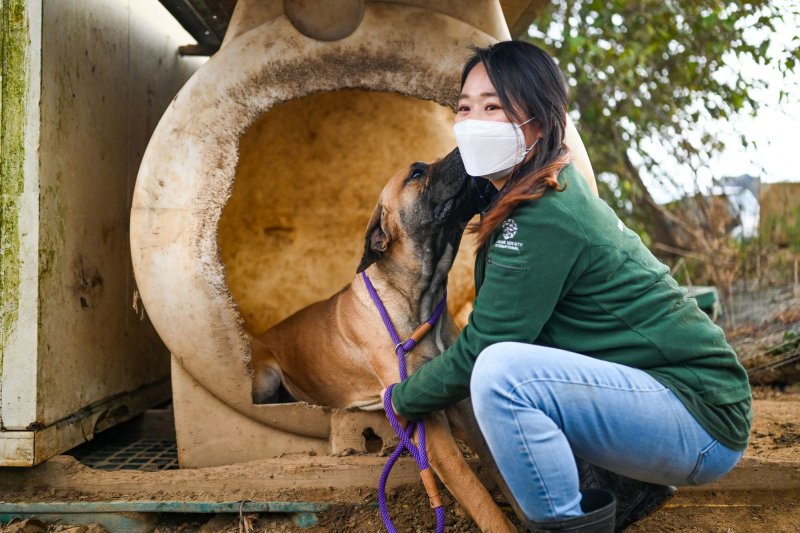1 of 8 | Nara Kim of Humane Society International is nuzzled by a dog at the closed dog meat farm. Photo by Thomas Maresca/UPI |
License Photo
HAEMI, South Korea, Oct. 28 (UPI) -- The sounds of barks, whines and squeals rang throughout the farm in a rural area on the west coast of South Korea, as dogs packed in filthy cages and holding pens reacted frantically to the presence of any human that approached.
Some 170 dogs, mainly Korean Jindos and mastiffs, had been bred and raised here for slaughter in the dog meat trade. But last Thursday they were given a new lease on life as the farm closed and workers from Washington D.C.-based animal rights group Humane Society International arrived to rescue the dogs and bring them to the United States for adoption.
This was the 17th farm closure in South Korea that HSI has facilitated, and the latest indication that the market for dog meat, a traditional delicacy in South Korea, is rapidly declining.
Farmer Kim Il-hwan, who has operated this farm for a decade but has been in the industry for some 40 years, said he has wanted to get out of the shrinking business for a long time.
"It's been really difficult the past five or six years," said Kim, who is receiving financial compensation and career assistance from HSI for closing the farm.
"Dog meat consumption is really low and is getting lower," he said. "I don't think anyone under 50 years old eats dogs anymore. The media coverage of the animal protection movement has changed people's minds so much. There's no future in dog farming."
While most people in South Korea don't consume dogs, the practice has been around for more than a thousand years and remains legal. It is most commonly seen in a stew called bosintang, which is eaten on the hottest days of the summer and is believed by some to boost vitality.
However, dog meat has been falling out of favor at a blistering pace, especially among younger Koreans. A Nielsen poll sponsored by HSI, released last week, found that 84% of South Koreans said they haven't consumed dog meat or won't eat it in the future. A 2018 poll by Gallup had that figure at 70%.
Another 59% of respondents in the new survey said they support banning dog meat, representing a 24% increase over a 2017 poll.
Nara Kim, HSI Korea's dog meat campaign manager, said the changing attitudes and the closing of farms such as the one in Haemi, give her hope that dog meat may be on the way out for good.
"There used to be many farms around [Haemi], but nowadays there are almost none left," she said. "So I'm very hopeful. I think it's vanishing here fast. I meet the farmers and I hear lots of things about this industry, and it is dying fast."
Kim pointed to the rising call for a ban on the dog meat industry as a significant step forward.
"I think this was the first time that more than 50% agreed to ban dog meat trade," she said. "Things are moving in the right direction."
Dog meat consumption is facing growing restrictions around the region, with individual cities and provinces in Cambodia, India and China enacting bans in recent months. The emergence of COVID-19 has also increased global concern and scrutiny over the safety of the wildlife trade.
Still, HSI estimates that over 2,800 registered dog farms are still in operation in South Korea, along with a large number of unregistered operations. Legally, the dog meat industry still exists in a largely unregulated space.
An amendment to the country's Animal Protection Act that would make killing dogs for food illegal was introduced last year, but has not yet been taken up in South Korea's National Assembly and faces strong opposition from industry lobbying groups and representatives from rural areas.
In the meantime, falling demand, negative public opinion and activist pressure have led to the closure of many of the country's largest slaughterhouses and markets in recent years.
Facilities at South Korea's two largest dog meat trading markets, Moran Market in Seongnam, south of Seoul, and Gupo Market, in Busan, were shut down over the past two years. Last year, Seoul officially declared the city free of dog slaughterhouses.
The changing attitudes toward dog meat by South Koreans have coincided with a sharp rise in pet ownership, as the Nielsen survey found that 63% of respondents have or have had a pet in the past. South Korean President Moon Jae-in brought attention to the subject by adopting a mutt named Tory, who was rescued from a dog meat farm, in 2017.
The 170 dogs rescued by HSI on the Haemi farm, along with 26 others that had previously been saved from the dog meat trade, arrived in the United States over the weekend, the animal rights group reported.
Most of the dogs, which included a a poodle, Pomeranians, terriers and a Labrador retriever, in addition to the Korean jindos and mastiffs, are being held at a temporary shelter in Maryland run by HSI and the Humane Society of the United States. They will receive necessary veterinary treatment before being moved to shelter partners across the United States in the coming weeks.
Kim Il-hwan, the farmer, said that he is glad to be out of the industry and is looking forward to finding work in a field such as construction.
He added that his own attitudes toward dogs have changed.
"I feel sorry for the dogs," he said. "I don't eat dog meat myself anymore. I'm happy for the dogs now. They are going to a good place."















